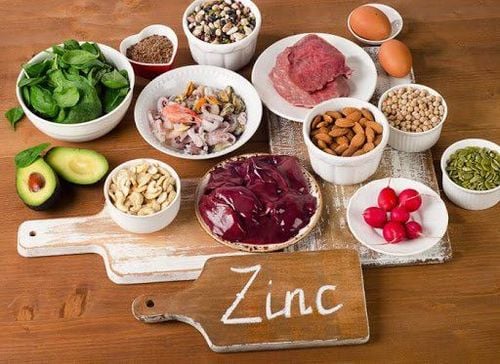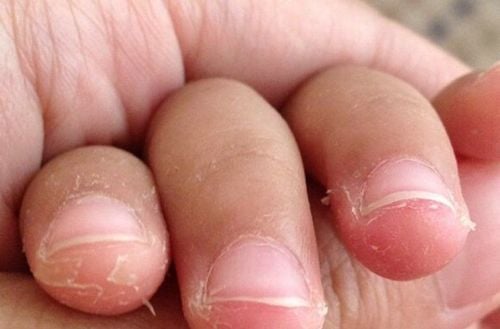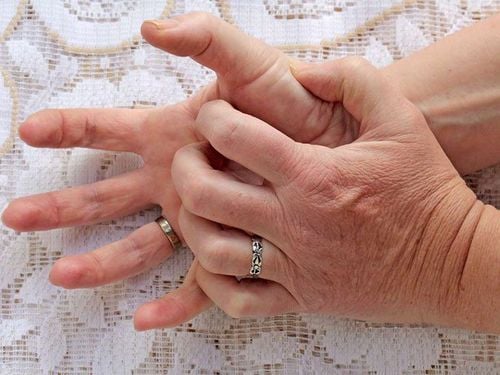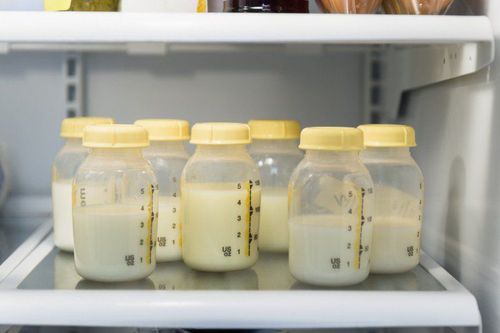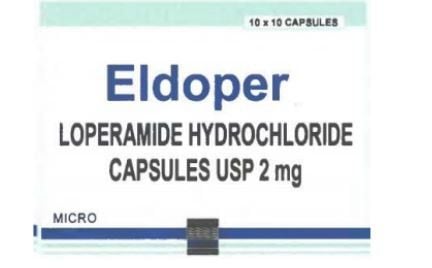Drinking enough water in children will help reduce anxiety and improve thinking ability. However, it is necessary to limit it to a sufficient level, not letting children drink too much water compared to the body's needs because this can cause unwanted consequences.
1. Benefits of giving children enough water
Before finding out if it is good for children to drink a lot of water, parents need to understand the benefits when children drink enough water. Specifically:
In a newly published study by the British Psychological Society in London: Students who bring water into the exam room will score about 10% higher than those who do not bring water. The University of London also conducted a similar experiment: Divide 9-year-old children into 2 groups - 1 group drank 250ml and the other group did not drink water. After taking the test for 20 minutes, the children who drank water scored up to 34% higher.
From research, scientists believe that brain cells can function more smoothly after being hydrated (because water in the body can promote cognitive ability in young children). Researchers believe that drinking enough water will reduce anxiety and contribute to improving children's thinking ability.
2. Is it good for children to drink a lot of water?
Although water is essential for the body's activities, drinking enough water is very important, but drinking a lot of water is not good for health. Whether it is a 1-year-old or a 2-year-old child, is it good for them to drink a lot of water? The answer is no. If children drink too much water, they may face some consequences such as:
Urinating too much: Normally, people will urinate 6-8 times/day. If children urinate more than 10 times/day, it means that they are dehydrated. Urinating too much will make children feel annoyed, tired, etc.;
Clear urine: Dark urine is a bad sign, but clear, colorless urine is also a sign that the body may be overhydrated;
Cramps: An imbalance of fluids in the body can affect muscle function, leading to muscle spasms and cramps. This happens when the body has to excrete too much water, reducing electrolyte levels, causing cramps;
Fatigue and stress: Taking in too much water in a short period will cause the kidneys to work harder to remove excess water. This overstimulates the adrenal glands (which are responsible for dealing with stress). When the body secretes too many stress hormones, the child will feel tired and uncomfortable;
Effects on the kidneys: The kidneys are responsible for filtering water. If the child drinks too much water, it will make the kidneys work harder. Over time, kidney function can be impaired, easily causing kidney disease;
Harmful to the heart: Drinking too much water can damage the heart because drinking too much water increases the volume of blood in the body, leading to an increased burden on the heart. This pressure can damage blood vessels or lead to epilepsy;
Brain damage: When children drink too much water beyond the kidney's ability to process, it will lead to an imbalance of sodium in the blood, which can damage the brain and body (water intoxication). Water intoxication is very harmful to the body, even leading to brain damage, coma and death;
Development of some diseases: If children drink too much water contaminated with iron, they are at risk of liver disease. Drinking too much water contaminated with chlorine can also cause children to have organ dysfunction and cancer.
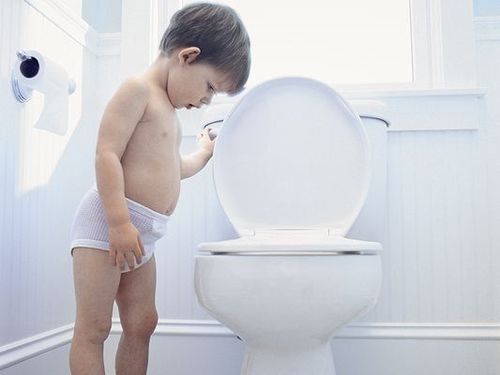
3. How much water is appropriate for children to drink?
To protect their children's health, parents need to give them enough water. However, many factors affect children's daily water needs such as hot or cold weather, high or low activity level, health or feverish, etc.
Recommendations on the appropriate amount of water (filtered water) to supplement each age in healthy children are as follows:
Children under 6 months old: Should not drink more water because the necessary amount of water for the baby is already provided by breast milk or formula;
Children 6 - 12 months old: The amount of water needed for the baby is related to breast milk or formula, health factors, general nutritional status of the child, etc. The general principle for the amount of water to drink in this age group of children is 125 - 250ml/day;
Children 1 year old: 250ml/day;
Children 2 years old: 500ml/day;
Children 3 years old: 750ml/day;
Children 4 years old: 1,000ml/day;
Children 5 years old: 1,250ml/day;
Children 6 years old: 1,500ml/day;
Children 7 years old: 1,750ml/day;
Children over 8 years old: 2,000ml/day.
If your child lives in a hot climate or is more physically active, their water needs will be higher. If your child is not growing well, your doctor may recommend replacing some of their daily water intake with another high-energy liquid such as whole milk. Adolescents and adults should ensure they drink at least 2,000ml of water/day.
4. What is the appropriate time for children to drink water?
Children drinking too much water will cause unwanted health consequences. But if they lack water, it is also not good. Normally, children rarely drink water on their own, only when they are very thirsty (this is a sign that the child's body is slightly dehydrated). Therefore, parents need to give their children enough water at the right times such as:
Between meals: Children should not drink water before or immediately after eating. The reason is that if they drink water before meals, it will create a feeling of fullness, making children not want to eat. Drinking water immediately after eating will affect the digestion process, causing children to have indigestion and poor absorption of nutrients. Therefore, parents should give their children water between meals;
After bathing: When bathing, the closed space and high temperature will speed up the evaporation of moisture on the skin, causing the child's skin to dry and the child will feel thirsty. Therefore, after bathing for about 15 minutes, parents should give their children water to speed up the process of metabolizing waste in the body and help soothe dry skin;
After waking up: Parents should limit their children's water intake before going to bed because it can cause them to hold their urine, affecting sleep quality and increasing the burden on the kidneys. Young children are also prone to bedwetting due to drinking too much water before going to bed. Therefore, parents should give their children water after waking up to reduce dry mouth, increase metabolism and improve their kidney function;
After crying: After the child is emotionally stable and stops crying, parents should give their children water. Because crying consumes water in the body, causing the child's throat to be dry and sore, it needs to be rehydrated. At the same time, giving children water also helps them dispel negative emotions.
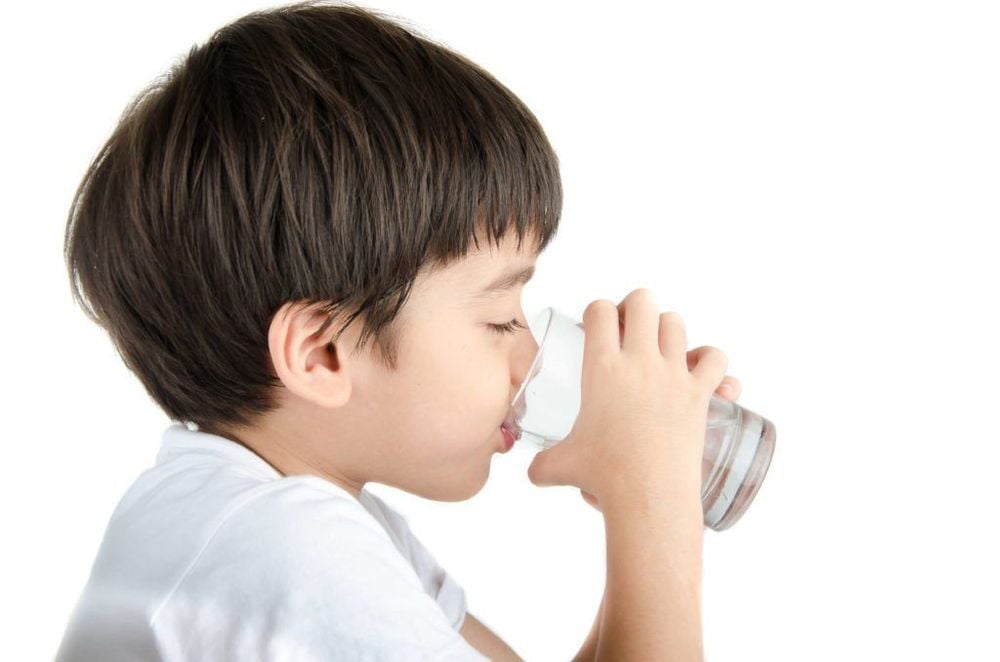
5. What types of water should not be given to children?
In addition to avoiding giving children too much water, parents should also not give their children the following types of water:
Water that is too cold or too hot: Children who drink too much cold water are prone to digestive disorders, constipation, weakened immune systems, etc. Children who drink hot water are prone to damage to the oral mucosa, esophagus, stomach and tooth sensitivity, etc. The temperature of drinking water for children is 35 - 38°C - close to the child's body temperature;
Fruit juice and sugary water: To entice children to drink more water, parents often add sugar or fruit juice to the water (water is sweeter, easier to swallow). However, this is something that parents should avoid because eating too much sugar can increase the burden on the heart and kidneys, easily leading to obesity, affecting the child's growth. According to doctors' recommendations, children under 1 year old should not eat sugar, children over 1 year old should eat as little as possible because the milk, food and fruit that children eat already provide enough sugar for the body's needs;
Water with high mineral content: This type of water can be harmful to your baby's health. Specifically, water with too many minerals will disrupt the balance of water components in the body, easily causing water to be lost;
Water left for more than 24 hours: Children should drink boiled water that has cooled during the day, not left until the next day because if the water is left for more than 24 hours, bacteria in the air can penetrate and reduce the quality of the water, affecting the health of the drinker. In addition, parents should pay attention to storing boiled water that has cooled in containers made from standard materials (do not use recycled plastic bottles), with tight lids.
Thus, to the question posed at the beginning of the article: Is it good for children to drink a lot of water, the answer is NO. Just make sure your child drinks enough water compared to the body's needs because drinking too much water can cause unwanted consequences. Parents should also pay attention to giving their children enough water at many times of the day, not drinking too much at once and not waiting until the child is thirsty to give them water, etc.
To arrange an appointment, please call HOTLINE or make your reservation directly HERE. You may also download the MyVinmec app to schedule appointments faster and manage your reservations more conveniently.




